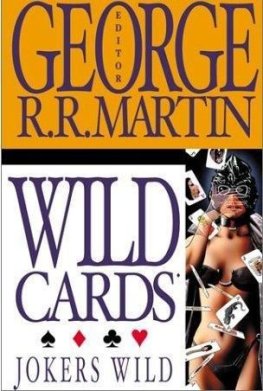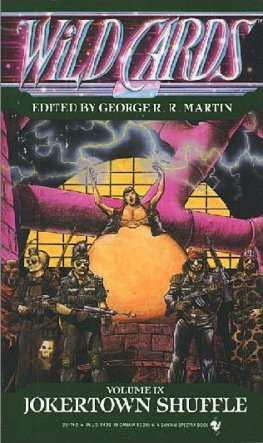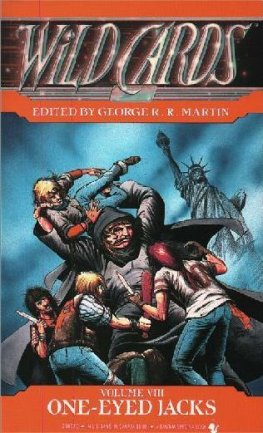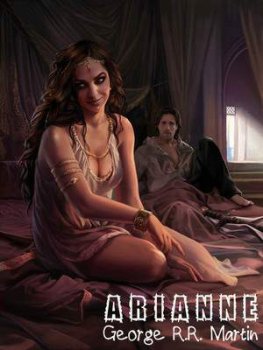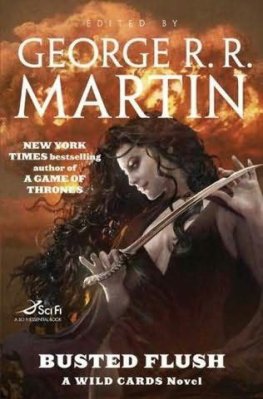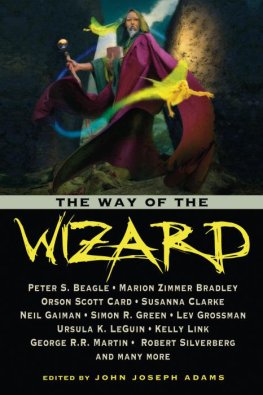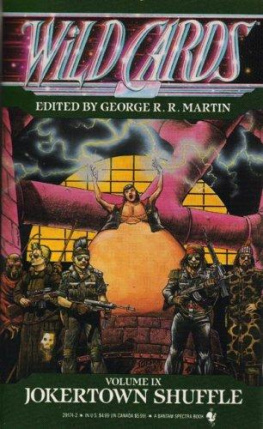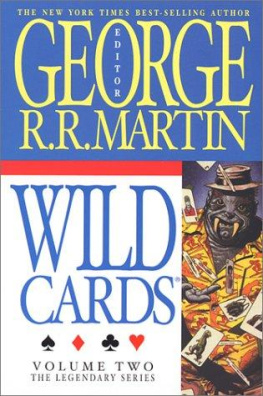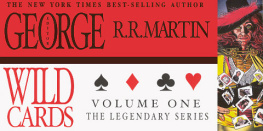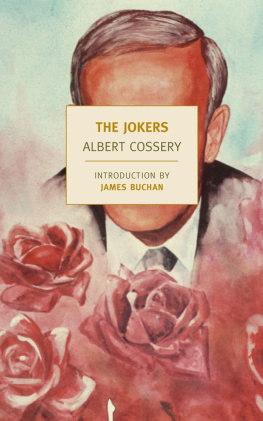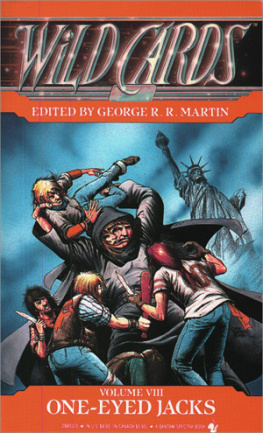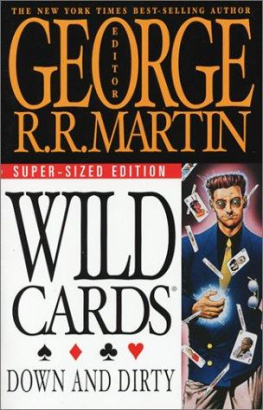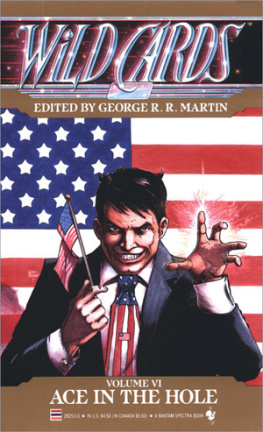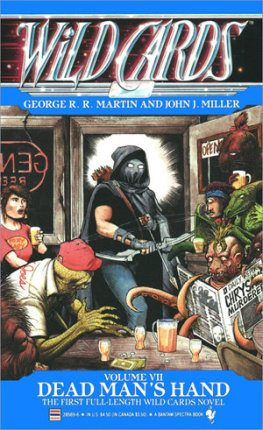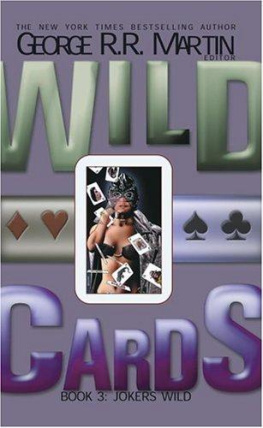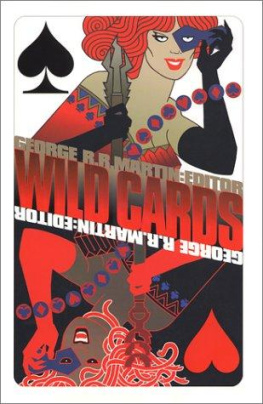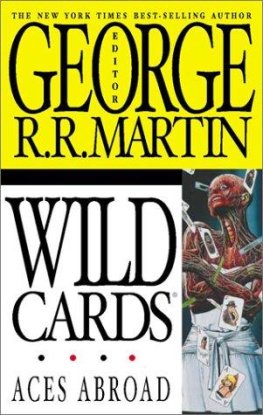George Martin - Jokers Wild
Here you can read online George Martin - Jokers Wild full text of the book (entire story) in english for free. Download pdf and epub, get meaning, cover and reviews about this ebook. genre: Science fiction. Description of the work, (preface) as well as reviews are available. Best literature library LitArk.com created for fans of good reading and offers a wide selection of genres:
Romance novel
Science fiction
Adventure
Detective
Science
History
Home and family
Prose
Art
Politics
Computer
Non-fiction
Religion
Business
Children
Humor
Choose a favorite category and find really read worthwhile books. Enjoy immersion in the world of imagination, feel the emotions of the characters or learn something new for yourself, make an fascinating discovery.
- Book:Jokers Wild
- Author:
- Genre:
- Rating:5 / 5
- Favourites:Add to favourites
- Your mark:
- 100
- 1
- 2
- 3
- 4
- 5
Jokers Wild: summary, description and annotation
We offer to read an annotation, description, summary or preface (depends on what the author of the book "Jokers Wild" wrote himself). If you haven't found the necessary information about the book — write in the comments, we will try to find it.
Jokers Wild — read online for free the complete book (whole text) full work
Below is the text of the book, divided by pages. System saving the place of the last page read, allows you to conveniently read the book "Jokers Wild" online for free, without having to search again every time where you left off. Put a bookmark, and you can go to the page where you finished reading at any time.
Font size:
Interval:
Bookmark:
George R R Martin
Jokers Wild
Prologue
There is Mardi Gras in New Orleans, Carnival in Rio, Fiestas and Festivals and Founders' Days by the hundreds. The Irish have St. Patrick's Day, the Italians Columbus Day, the nation its Fourth of July. History is full of mummers' parades and masques and orgies and religious pageants and patriotic extravaganzas.
Wild Card Day is a little of all of that, and more.
On September 15, 1946, in the cold afternoon sky over Manhattan, Jetboy died and the Takisian xenovirus-known colloquially as the wild card-was loosed upon the world.
It is unclear just when the observances began, but by the late sixties, those who had felt the touch of the wild card and had lived to talk of it, the jokers and aces of New York City, had taken the day as their own.
September 15 became Wild Card Day. A time for celebrations and lamentations, for grief and joy, for remembering the dead and cherishing the living. A day for fireworks and street fairs and parades, for masked balls and political rallies and memorial banquets, for drinking and making love and fighting in the alleys. With each passing year, the festivities became larger and more fevered. Taverns and restaurants and hospitals did record-setting business, the media began to notice, and finally, of course, the tourists arrived.
Once a year, without sanction or statute, Wild Card Day engulfed Jokertown and New York City, and the carnival of chaos ruled the streets.
September 15, 1986, was the fortieth anniversary.
Chapter One
6:00 a.m.
It was as dark as it ever gets on Fifth Avenue, and as quiet.
Jennifer Maloy glanced at the streetlights and the steady stream of traffic, and pursed her lips in annoyance. She didn't like all the light and activity, but there wasn't much she could do about it. This was, after all, Fifth Avenue and 73rd Street in the city that never sleeps. It had been equally as busy the past few mornings she'd spent checking out the area and she had no reason to expect that conditions would ever get any better.
Hands thrust deep into the pockets of her trench coat, she strode past the five-story graystone apartment building and slipped into the alley behind it. Here was darkness and si lence. She stepped into an area of the alley that was screened by a garbage dumpster and smiled.
No matter how many times she'd done this, she thought, it was still exciting. Her pulse speeded up and she breathed faster in anticipation as she put on a hoodlike mask that obscured her finely sculpted features and hid the mass of blond hair tied in a knot at the back of her head. She took off her trench coat, folded it neatly, and set it down next to the dumpster. Under the coat she wore only a brief black string bikini and running shoes. Her body was lean and gracefully muscular, with small breasts, slim hips, and long legs. She bent down, unlaced and removed her sneakers and put them next to the trench coat.
She ran a hand almost caressingly over the rear wall of the graystone apartment building, smiled, and then walked right through the wall.
It was the sound of a power saw biting into sodden hardwood. The whine of steel teeth made Jack's own teeth ache as the all-too-familiar boy struggled to hide deeper within the cypress tangle.
"He in dere somewhere!" It was his uncle Jacques. The folks around Atelier Parish called him Snake Jake. Behind his back.
The boy bit his lip to keep from crying out. He bit deeper, tasting blood, to keep from changing. Sometimes that worked. Sometimes.
Again the steel saw shrieked into wet cypress. The boy ducked down low; brown, brackish water slopped against his mouth, into his nose. He choked as the bayou washed over his face.
"Tol' you! Dat little gator-bait right dere. Get 'im." Other voices joined in.
The power saw blade whined one more time.
Jack Robicheaux flailed out in the darkness, one arm trapped in the sweaty sheet, the other reaching for the phone. He slammed the Tiffany lamp back against the wall, cursed as he somehow caught its petals-and-stems base and steadied it on the bed table, then felt the cool smoothness of the telephone. He picked up the receiver in the middle of the fourth ring.
Jack started to curse again. Who the hell had this number? There was Bagabond, but she was in another room here in his home. Before he could get his lips to the mouthpiece, he knew.
"Jack?" said the voice on the other end of the line. Longdistance static washed out the sound for a second. "Jack, this is Elouette. I'm callin' you from Louisiana."
He smiled in the darkness. "Figured you were." He snapped the lamp switch, but nothing happened. The filament must have broken when the lamp toppled.
"Never actually called this far before," said Elouette. "Robert always dialed." Robert was her husband.
"What time is it?" Jack said. He felt for his watch. "'Bout five in the morning," said his sister.
"What is it? Is it Ma?" He was waking up finally, pulling free from the fragments of the dream.
"No, Jack, Ma's fine. Nothin'll ever happen to her. She'll outlive us both."
"Then what?" He recognized the sharpness in his voice and tried to tone it down. It was just that Elouette's words were so slow, her thoughts so drawn-out.
The silence, punctuated by bursts of static, dilated on the line. Finally Elouette said, "Its my daughter."
"Cordelia? What about her? What's wrong?" Another silence. "She's run off."
Jack felt an odd reaction. After all, he'd run away too, all those years before. Run away when he was a hell of a lot younger than Cordelia. What would she be now, fifteen? Sixteen? "Tell me what happened," he said reassuringly.
Elouette did. Cordelia (she said) had given little warning. The girl had not come down for breakfast the morning before. Makeup, clothing, money, and an overnight bag were also gone. Her father had checked with Cordelia's friends. There weren't many. He called the parish sheriff. The patrols got the word. No one had seen her. The law's best guess was that Cordelia had hitched a ride out on the blacktop.
The sheriff had shaken his head sadly. "Gal looks like that," he'd said, "well, we got cause to worry." He'd done what he could, but it had all taken precious time. It had finally been Cordelia's father who'd come up with something. A girl with the same face ("Purtiest little thing I seen in a month," the ticket clerk had said) and long, luxuriant, black hair ("Black as a new-moon bayou sky," said a porter) had boarded a bus in Baton Rouge.
"It was Greyhound," Elouette said. "One-way fare to New York City. By the time we found out, the police said it wasn't none too practical to try and stop it in New Jersey." Her voice shook slightly, as though she wanted to cry.
"It'll be okay," said Jack. "When's she supposed to get here?"'
"About seven," Elouette said. "Seven vour time." "Merde." Jack swung his legs off the bed and sat up in the darkness.
"Can you get there, Jack? Can you find her?"
"Sure," he said. "But I gotta leave now for Port Authority, or I won't make it in time."
"Thanks be," Elouette said. "Call me after you've met her?"
"I will. Then well figure out what to do next. Now I go, okay?"
"Okay. I'll be right here. Maybe Robert will be back too." Trust filled her voice. "Thanks, Jack."
He put down the phone and stumbled across the room. He found the wall switch and finally was able to see in the windowless room. Yesterday's work clothes were strewn over the rough slab bench to one side. Jack pulled on the well-worn jeans and green cotton shirt. He grimaced at the fragrant work socks, but they were all he had. Today being his day off, he'd planned to spend it at a laundromat. He laced the steel-toed leather boots quickly, catching every other pair of eyelets.
Font size:
Interval:
Bookmark:
Similar books «Jokers Wild»
Look at similar books to Jokers Wild. We have selected literature similar in name and meaning in the hope of providing readers with more options to find new, interesting, not yet read works.
Discussion, reviews of the book Jokers Wild and just readers' own opinions. Leave your comments, write what you think about the work, its meaning or the main characters. Specify what exactly you liked and what you didn't like, and why you think so.

